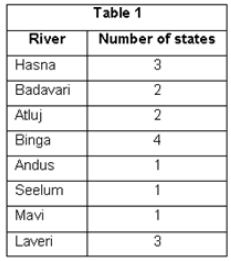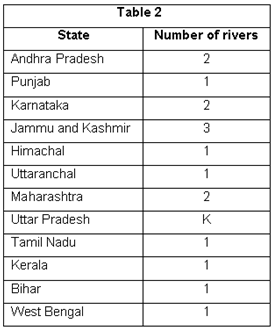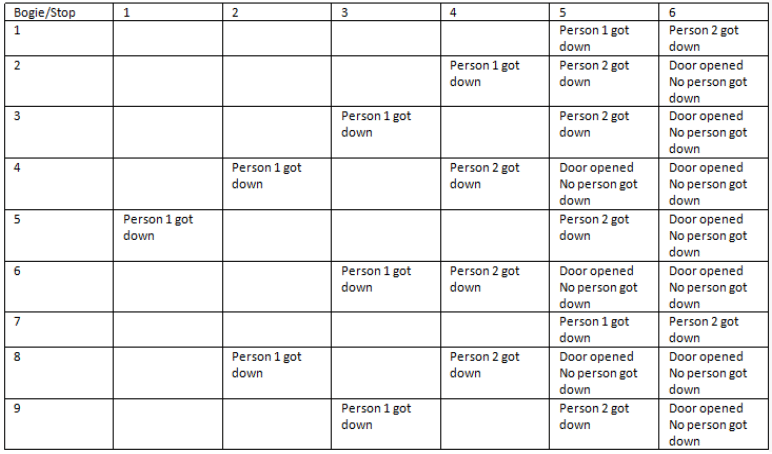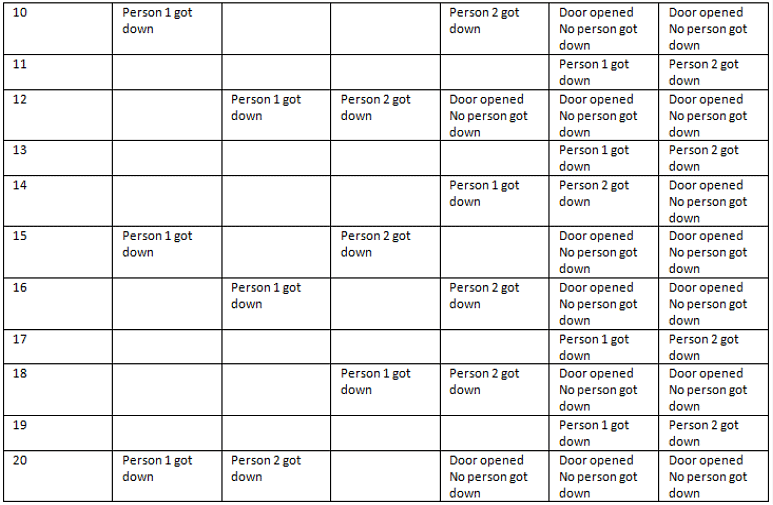Test: PU LLB Mock Test - 3 (New Pattern) - CLAT MCQ
30 Questions MCQ Test - Test: PU LLB Mock Test - 3 (New Pattern)
The Manas Wildlife Sanctuary is located in the state of
Which of the following causes the highest carbon dioxide emission?
Who is the author of the book Ignited Minds?
Bebinca is a famous dessert of which state?
The International Court of Justice (ICJ), in Feb 2018, elected which of the following as its new President?
During which Viceroy's tenure was the Durand Commission set up?
Which of the following banks have been removed from the PCA (Prompt Corrective Action) framework recently?
During which season is the incidence of melioidosis expected to peak?
What is one of the primary challenges that Anura Kumara Dissanayake’s presidency may face?
Principle: Willful rash driving is an offense.
Facts: Mr. Tiwari was driving his car after drinking alcohol. Police booked him for willful negligent driving. Is the act of the police lawful?
Principle: Injuria Sine Damnum i.e. Injury (violation of legal right) without damage
Facts: X, who was the returning officer at a polling booth in Amethi, wrongly refused to register a duly tendered vote of Y in the recent UP elections, even though Y was an eligible voter. The candidate in whose favor Y wanted to vote, was declared elected. Give the appropriate answer-
Principle: Every person, who is of the age of majority, is competent to contract according to the law to which he is subject.
Facts: A minor mortgaged his house in favor of Thakur Das, a money lender, to secure a loan of Rs. 20000. A part of this, i.e. Rs. 10500 was actually advanced to him. While considering the proposed advance, the attorney who was acting for the money lender, received information that the plaintiff was still a minor. Subsequently the minor commenced an action stating that he was underage when he executed the mortgage and the same should, therefore, be canceled. He prayed for setting aside the mortgage. The mortgagee money lender prayed for the refund of Rs. 10500 from the minor.
Principle: A paid, Rs. 15,000 to B to secure a seat for his son in the Regional Engineering College by using his influence with the Selection Committee. B fails to secure a seat for A's son. A sues to recover the amount of Rs. 15,000/
Facts: A contract is an agreement which the law will enforce. All agreements are contracts if they are made with free consent by parties competent to contract for a lawful consideration and with a lawful object.
Assertion (A): The state shall not make any law, which takes away or abridges the rights conferred by Part III (Fundamental Rights) and any law made in contravention of this clause shall, to the extent of the contravention, be void.
Reason (R): The fundamental rights are the rights reserved by the people and for this reason they are eternal and sacrosanct.
Principle: When one person signifies to another his willingness to do or abstain from doing anything, with a view to obtaining the assent of that person to such an act or abstinence, he is said to have made a proposal.
Fact: “Ramanuj telegraphed to Shyam Sunder, writing: “Will you sell me your Rolls Royce CAR?Telegram the lowest cash price.” Shyam Sunder also replied by telegram: “Lowest price for CAR is Rs. 20 lakh.” Ramanuj immediately sent his consent through telegram stating: “I agree to buy the CAR for Rs. 20 lakh as asked by you.” Shyam Sunder refused to sell the car.
Agreements, the meaning of which is not certain, or not capable of being made certain, are void.
Facts: A horse was bought for a certain price coupled with a promise to give Rs.500 more if the horse is proved lucky.
Principle: Any direct physical interference with goods in somebody’s possession without lawful justification is called trespass of goods.
Facts: Z purchased a car from a person who had no title to it and sent it to a garage for repair. X believing wrongly that the car was his, removed it from the garage.
Principle: Everybody is under a legal obligation to take reasonable care to avoid an act or omission which he can foresee would injure his neighbor, the neighbor for this purpose is any person whom he should have in mind as likely to be affected by his act.
Facts: Krishnan, while driving a car at a high speed in a crowded road, knocked down a cyclist. The cyclist died on the spot with a lot of blood spilling around, Lakshmi, a pregnant women passing by, suffered from a nervous shock, leading to abortion. Lakshmi filed a suit against Krishnan claiming damages.
Assertion (A): In the Event of violation of any legal right (tort) the aggrieved party is entitled to recover unliquidated damages.
Reason (R): The object of awarding damages to the aggrieved party is to put him in the same position in which he would have been if the wrong would not have been committed. Damages are therefore assessed on that basis.
Principle: Only Parliament or State Legislatures have the authority to enact laws on their own. No law made by the State can take away a person’s fundamental right.
Facts: Parliament enacted a law, which according to a group of lawyers is violating the fundamental rights of traders. A group of lawyers files a writ petition challenging the Constitutional validity of the statute seeking relief to quash the statute and further direct Parliament to enact a new law.
Principle: An agreement is enforceable at law if parties who have attained majority and are competent to contract enter into it with free consent, for consideration. And the contract is not contrary to law and against public policy.
Facts: A, a boy of 16 years entered into an agreement to sell his flat at Bandra for a sum of Rs. 5 lakhs. A's father is very annoyed with A at the transaction and does not allow delivery. The buyer files a suit for a specific performance.
Four alternatives are given for the Idioms/Phrase printed in bold. Choose the alternative which best expresses the meaning of Idiom/Phrase.
Drive home
In the following questions, some of the sentences have errors and some have none. Find out which part of a sentence has an error. The number of that part is the correct answer. If there is no error. The answer is (d).
The train arrived (A)/ in Shibuya station (B)/ fifty seconds late. (C)/ No Error (D)
Out of the four alternatives, choose the one which best expresses the meaning of the given word.
SLEUTH
In these questions some of the sentences have errors and some have none. Find out which part of a sentence has an error and indicate it corresponding to the appropriate letter. If there is no error, indicate corresponding to the last option
For times immemorial (A) / sea shells have been used by man (B) / in many ways. (C) / No error (D)
Direction: Study the given information and answer the following question.
In an exhibition, there is a train with 24 bogies numbered 1 to 24. Each bogie has 2 seats only. It moves all over the exhibition in a circular path and reaches to the same point. It stops at 5 places before coming to the starting point, i.e. it stops at the same place 6th time.
The following information is given about stops:
(i) The stops were considered as stop 1, stop 2, ……… and stop 6 (the starting point).
(ii) At nth stop, only the doors of bogies whose numbers are multiples of (6 – n) will be opened, i.e. at stop 1, the doors whose numbers are multiples of (6 – 1) = 5 will be opened.
(iii) At stop 6, all the doors will be opened.
(iv) Assume that all the bogies are full of passengers and the two persons in the same bogie should not get down together at the same stop, but if the door of any bogie is opened at any stop and if there is a person in that bogie, he has to get down at that stop.
Q. How many persons got down at stop 4?
Direction: Read the following information and answer the question that follows.
There are 8 major rivers which flow in India. The following information gives the number of states in which these rivers flow (table 1) and the number of the rivers in each state (table 2).
‘k’ in table 2 represents the number of rivers flowing in Uttar Pradesh (UP).


It is also known that
- There is no other river in the state where Binga flows.
- Andus, Seelum and Mavi, all flow through one common state.
- Hasna and Badavari go through one common state, and Hasna and Laveli also flow through one common state.
- The river which flows in Kerala also goes to Tamil Nadu.
- The river which flows in UP also flows in Uttaranchal and Bihar.
The river which flows in Punjab also flows in Himachal Pradesh and there is no other river in these states.
Q. In which of the following states does Binga flow?
If it is possible to make a meaningful word with the first, the fourth, the seventh and the eleventh letters of the word "INTERPRETATION', which of the following will be third letter of that word ? If more than one such word can be made, give M as the answer and if no such word can be made, give X as the answer.






















